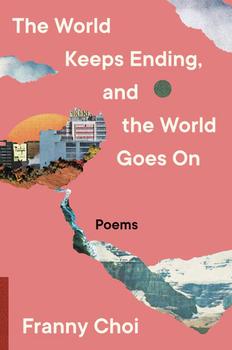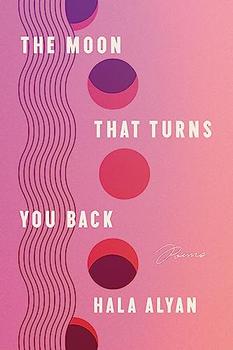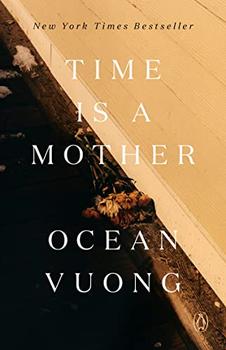Summary | Excerpt | Reviews | Beyond the book | Read-Alikes | Genres & Themes | Author Bio

From acclaimed poet Franny Choi comes a poetry collection for the ends of worlds—past, present, and future. Choi's third book features poems about historical and impending apocalypses, alongside musings on our responsibilities to each other and visions for our collective survival.
Many have called our time dystopian. But The World Keeps Ending, and the World Goes On reminds us that apocalypse has already come in myriad ways for marginalized peoples.
With lyric and tonal dexterity, these poems spin backwards and forwards in time--from Korean comfort women during World War II, to the precipice of climate crisis, to children wandering a museum in the future. These poems explore narrative distances and queer linearity, investigating on microscopic scales before soaring towards the universal. As she wrestles with the daily griefs and distances of this apocalyptic world, Choi also imagines what togetherness--between Black and Asian and other marginalized communities, between living organisms, between children of calamity and conquest--could look like. Bringing together Choi's signature speculative imagination with even greater musicality than her previous work, The World Keeps Ending, and the World Goes On ultimately charts new paths toward hope in the aftermaths, and visions for our collective survival.
THE WORLD KEEPS ENDING, AND THE WORLD GOES ON
Before the apocalypse, there was the apocalypse of boats:
boats of prisoners, boats cracking under sky-iron, boats making corpses
bloom like algae on the shore. Before the apocalypse, there was the apocalypse
of the bombed mosque. There was the apocalypse of the taxi driver warped
by flame. There was the apocalypse of the leaving, and the having left—
of my mother unsticking herself from her mother's grave
as the plane barreled down the runway. Before
the apocalypse, there was the apocalypse of planes.
There was the apocalypse of pipelines legislating their way through sacred water,
and the apocalypse of the dogs. Before which was the apocalypse of the dogs
and the hoses. Before which, the apocalypse of dogs and slave catchers
whose faces glowed by lantern light. Before the apocalypse, the apocalypse of bees. The apocalypse of buses. Border fence
apocalypse. Coat hanger apocalypse. Apocalypse in the ...
How Choi plays with tense and time is my favorite aspect of her collection. In "Comfort Poem," the speaker of the piece is sitting at home curled up with a cat, using the present tense through the first two stanzas. In the third stanza, the poem moves into the past tense as the speaker comforts someone through a life-altering surgery. Throughout the next section, Choi uses variations on the phrase "comfort woman" to detail explicit moments of sexual violence in the past. That section is very visceral and seems like it is occurring in the speaker's present because of it. Here, I feel a level of uncomfortable intimacy with the speaker; I am transported to generational memories, ruminations of lived experiences, and conversations about devastation she has borne witness to. There are many instances in which I feel as if I am physically invading Choi's headspace as she writes to process traumas, but sometimes that seems like a very important place for me to be as a bystander...continued
Full Review
(878 words)
This review is available to non-members for a limited time. For full access,
become a member today.
(Reviewed by Lisa Ahima).
 Brenda Shaughnessy, author of The Octopus Museum and Tanya
Virtuosic visionary Franny Choi beholds brutal reality and, with uncanny and singular genius, transforms it into revolution. Choi believes community, family, history, eros, truth, and love demand change worth living for/through. This book gives blood, voice, and generations of memory to the slim chance that we can change this world enough to survive its endless dystopia, war, violence. Somehow this poet still believes in us: that we might read this work and, made bold with desire, love the world so deeply it has to love us back.
Brenda Shaughnessy, author of The Octopus Museum and Tanya
Virtuosic visionary Franny Choi beholds brutal reality and, with uncanny and singular genius, transforms it into revolution. Choi believes community, family, history, eros, truth, and love demand change worth living for/through. This book gives blood, voice, and generations of memory to the slim chance that we can change this world enough to survive its endless dystopia, war, violence. Somehow this poet still believes in us: that we might read this work and, made bold with desire, love the world so deeply it has to love us back. Eve L. Ewing, author of 1919 and Electric Arches
It was Franny Choi who first taught me the truism that every utopia requires an attendant dystopia, and here she catalogues them both with aplomb. Choi charts a path through the gloom and ecstasy of everyday catastrophe, always more mundane than we expected. It's dull and violent and lined with ancestral memory and mushrooms ready to forage. Anyone who has lived through the daily absurdity of disaster— which is to say, all of us— can find a home here.
Eve L. Ewing, author of 1919 and Electric Arches
It was Franny Choi who first taught me the truism that every utopia requires an attendant dystopia, and here she catalogues them both with aplomb. Choi charts a path through the gloom and ecstasy of everyday catastrophe, always more mundane than we expected. It's dull and violent and lined with ancestral memory and mushrooms ready to forage. Anyone who has lived through the daily absurdity of disaster— which is to say, all of us— can find a home here. Roxane Gay
Franny Choi is one of my favorite poets and her new collection does not disappoint. These are incisive, elegant poems. There is a throughline of grief in many of the [poems] but the work demonstrates both stylistic and intellectual range. So excited for people to get into this book.
Roxane Gay
Franny Choi is one of my favorite poets and her new collection does not disappoint. These are incisive, elegant poems. There is a throughline of grief in many of the [poems] but the work demonstrates both stylistic and intellectual range. So excited for people to get into this book.Franny Choi's The World Keeps Ending, and the World Goes On delves into how Korean women were treated before, during and after the Korean War, as well as the generational trauma and isolation resulting from this treatment. One aspect of this is the experience of military brides, or Korean women who married members of the American military stationed in the country during or after the war. Despite the horrors some of these women may have experienced or feared in Korea, including economic hardship and sexual violence, there is a significant amount of difficulty that comes with fleeing one's homeland for marriage in a foreign country. In many accounts of Korean military bride history, the actual lives of individual women are not present in the ...
This "beyond the book" feature is available to non-members for a limited time. Join today for full access.

If you liked The World Keeps Ending, and the World Goes On, try these:

by Hala Alyan
Published 2024
From the author of The Arsonists' City and The Twenty-Ninth Year, a new collection of poetry that traces the fragmentation of memory, archive, and family–past, present, future–in the face of displacement and war.

by Ocean Vuong
Published 2023
The highly anticipated collection of poems from the award-winning writer Ocean Vuong.




The library is the temple of learning, and learning has liberated more people than all the wars in history
Click Here to find out who said this, as well as discovering other famous literary quotes!